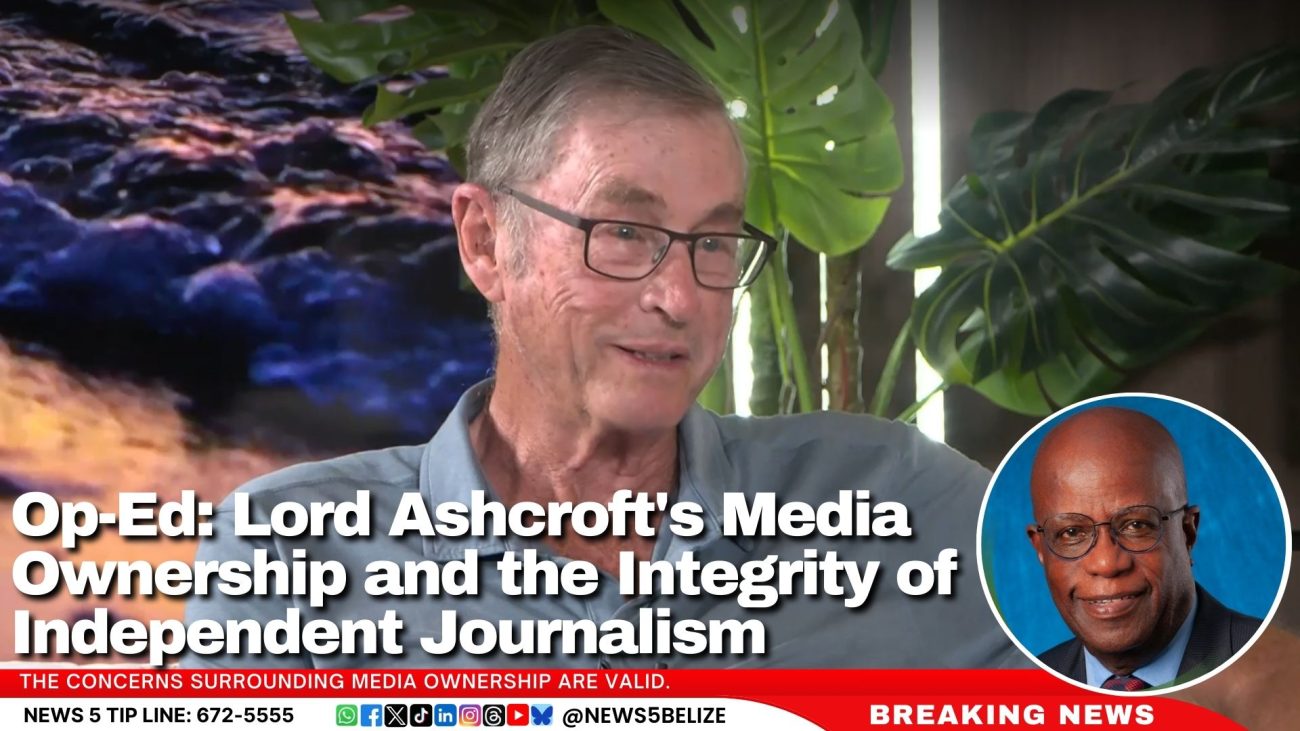Op-Ed: Lord Ashcroft’s Media Ownership and the Integrity of Independent Journalism
The intersection of media ownership and editorial independence has long been a subject of scrutiny. Scepticism is natural when a public figure owns a media house—questions about bias, influence, and credibility often follow. Yet, Lord Ashcroft’s recent interview with Channel 5 Belize, which he owns, offers a compelling counterpoint to the assumption that ownership inherently compromises independence.
Through this interview, Lord Ashcroft engaged with critical societal issues and allowed the platform to function as a space for transparency and accountability. His remarks, far from self-serving, invited critical engagement and demonstrated that independent journalism can thrive even under the ownership of a prominent figure.
A Demonstration of Ethical Ownership
The concerns surrounding media ownership are valid. History offers no shortage of examples of ownership being leveraged to manipulate narratives or silence dissent. However, Lord Ashcroft’s approach stands apart. Rather than using his platform to insulate himself from critique, he has fostered an environment where editorial integrity is prioritised.
The interview itself is evidence of this philosophy. It was not a vanity piece; it featured probing questions and candid reflections, showcasing a commitment to meaningful discourse. The willingness to address complex topics and present unvarnished truths speaks to a media house that values journalistic principles over serving its owner’s interests.
The Importance of Transparency
One of the hallmarks of Lord Ashcroft’s leadership is his openness about his dual roles as the media house’s owner and public figure. This transparency is essential in building trust with audiences. By acknowledging his ownership upfront, the media house avoids the perception of hidden agendas, ensuring that readers and viewers can assess the content with full awareness of the context.
Moreover, the media house has clear editorial policies designed to safeguard independence. These safeguards—whether in the form of an autonomous editorial board or rigorous journalistic standards—ensure that the newsroom operates without interference, even from its owner.
Setting a Standard for Media Owners
Lord Ashcroft’s example highlights an important lesson: ownership does not have to equate to control. Responsible media ownership involves respecting the boundaries between business interests and journalistic practices. By prioritising editorial independence, media owners can uphold the integrity of their platforms while contributing to a well-informed society.
In a time when trust in the media is at an all-time low, this ownership model offers a pathway forward. It demonstrates that media houses can maintain credibility and independence while benefiting from the resources and vision of committed ownership. Lord Ashcroft’s media house is a case study of how these dynamics can coexist productively.
Rebuilding Trust in Media
Scepticism surrounding media ownership is rooted in a broader crisis of trust in journalism. Too often, audiences wonder whether hidden hands or ulterior motives shape their news. Lord Ashcroft’s approach—combining transparency, accountability, and respect for editorial independence—offers a blueprint for rebuilding that trust.
His media house has shown that it is possible to report fairly and critically, even on matters involving its owner. This commitment to independence reinforces the idea that a media platform’s credibility lies not in who owns it but in how it operates.
Final Thought
The relationship between media ownership and editorial independence will always be complex, but it is not inherently adversarial. Lord Ashcroft’s stewardship of his media house demonstrates that ethical ownership and commitment to journalistic integrity can result in a platform that informs, challenges, and inspires.
Lord Ashcroft has set an example for others in similar positions by fostering a culture of independence within his organisation. In doing so, he reminds us that trust in the media is not just about who owns the microphone but how the voice behind it chooses to use it.
Julian Rogers is a journalist and media consultant hired by Lord Ashcroft’s Waterloo Investments to help transform Great Belize Productions, the operators of Channel 5 Belize.







Facebook Comments